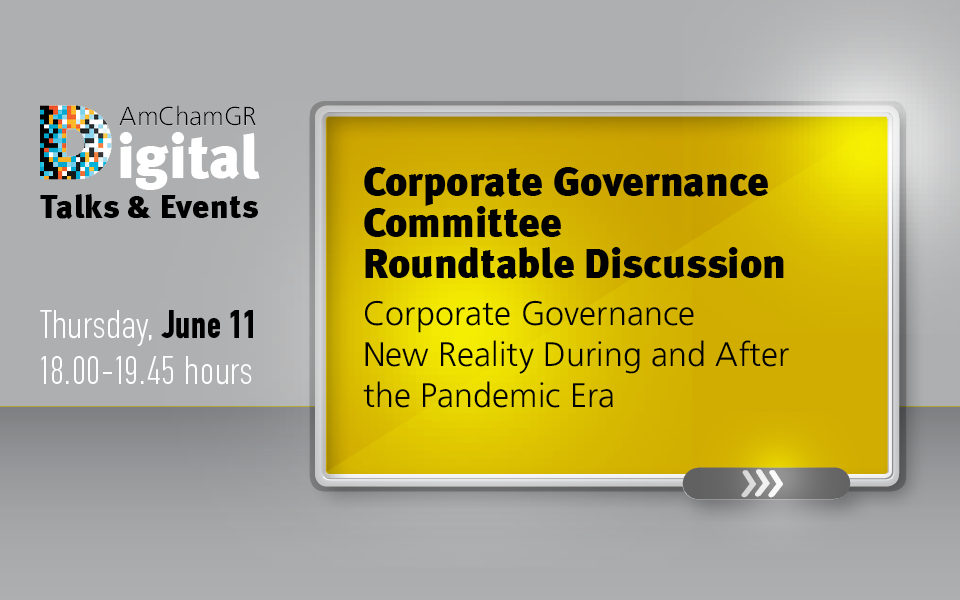
The Corporate Governance Committee of the American-Hellenic Chamber of Commerce organized this virtual event in order to capture the critical role of the Board in these times and the increased regulatory requirements of Corporate Governance.A look at how an effective risk and oversight system and digital practices of Board Governance give organizations the ability to deal with crises of this nature, engaging trust relationships with all stakeholders and creating a corporate purpose for long term sustainability.
 THE CRISIS AND THE INCREASED REQUIREMENTS FOR AN EFFECTIVE CORPORATE GOVERNANCE
THE CRISIS AND THE INCREASED REQUIREMENTS FOR AN EFFECTIVE CORPORATE GOVERNANCE
An interesting discussion on the effect of the current health crisis on Corporate Governance issues of the companies listed on the Athens Exchange, took place in the context of the event.
This session was moderated by Mr. Xenofon Avlonitis, Executive General Manager of Alpha Bank. Ms Vasiliki Lazarakou, Chairperson of the Hellenic Capital Market Commission and Mr. Andreas Shiamishis, CEO of the Hellenic Petroleum S.A., analyzed both the current situation on the day-to-day operation of listed companies, as well as the main provisions of the upcoming updated law on Corporate Governance.
Ms. Vasiliki Lazarakou praised the development dimension of said law, arguing that Corporate Governance constitutes one of the major tools for the smooth operation of the company and makes it more attractive to investors, adding that “we should not only amend the law, but also our culture on corporate governance matters”.
Being on the same page, Mr. Andreas Shiamishis, agreed that Corporate Governance should be perceived more as a management tool and less as a supervisory tool, while substantiating his view with a variety of day-to-day examples. “The law is in the right direction,” he noted, referring, to the composition of the board of directors and especially to the balance between executive and independent members, as well as to the enhanced role of the Audit Committees.
In the context of the same event, the Chair of the HCMC revealed that, following further deliberations with the Ministry of Finance, the Competent Authority will not approve the fit & proper of listed companies’ Board members and that while the draft law is in final form, she would expect the Ministry of Finance to table it shortly for a vote.
The new law seeks to upgrade internal control procedures as it contributes to the process of improving the operation of companies.
 CRISIS MANAGEMENT UNDER THE FRAMEWORK OF RISK MANAGEMENT
CRISIS MANAGEMENT UNDER THE FRAMEWORK OF RISK MANAGEMENT
This session was moderated by Mr. George Vlachos, Group International Director, Board Advisory Services, Stanton Chase. Invited speaker was Mr. Vassilis Antoniades, Partner, The Boston Consulting Group.
The impact of this type of Crisis developed a new Economic Crisis and Financial and Non-Financial Risks for the enterprises of every type and size across the world.
New Regulatory requirements and Rules from the Investment Community and expectations from the Society for Wider Value Returns impacted the Corporate Governance Purpose and the Foundations of it are more that important than ever.
However, some important frameworks and models for Corporate Governance practices that dealing with this Crisis and the Risk management are already emerging.
The role of the Board in these times is crucial in guiding the organization through incredibly tough times. As a matter of fact, a Prevent Risk system of board governance can give to organizations the balanced ability to deal with the Crises of this nature.
The Board have to ensure management is covering all the critical issues, We are in a situation where the Board should set up the main guidelines to define the right governance in order the company to stay in business, or to be able to deal with the extremely difficult circumstances.
Design and roll-out a post COVID-19 management governance with effective risk and oversight systems, it is essential. Company’s top management should be involved in a steering committee and an Emergency leader has to be appointed to coordinate the effort together with an Operative team involving business line heads.
The Creation of a Project Management Office to monitor the progress, status, prepare reports, the communication strategy, covering key business areas and other risks and to record lessons learnt and future improvements, is imperative.
 FINANCIAL REPORTING
FINANCIAL REPORTING
This session was moderated by Ms Maria Theodoulidou, Finance Director, Controlling & Planning of FOURLIS Group. Mr. Andreas Hadjidamianou, Partner in Associate of EY, presented the impact of the coronavirus pandemic to the financial statements and the role of the Audit Committies.
How the audit is conducted in areas such as impairment of non financial assets, going concern assessment, loan covenants and fair value assessment was explained and the requirements of the oversight bodies was discussed.
 BOD AND GENERAL ASSEMBLY MEETINGS
BOD AND GENERAL ASSEMBLY MEETINGS
This session was moderated by Mr. John Apsouris, Group General Counsel, Hellenic Petroleum S.A., with invited speaker Mr. Socrates Lazaridis, CEO of the Athens Exchange Group.
The option to hold General Assemblies or Board meetings by teleconference is provided by Laws on corporations for more than a decade, yet such option was rarely followed. During the pandemic, it became a necessity and most companies are now used to hold the meetings of their collective corporate bodies by teleconference. This is a positive development.
General Assembly meetings held by videoconference enhance the active participation of more shareholders to such GAs. The digital tools available permit the safe identification of shareholders, the secure connection and easy access to the panel of the Assemblies and the registration of shareholder votes. This is an excellent opportunity for Custodians to enhance their services. At the same time, teleconferences permitted more often Board and committee meetings, with a more efficient time management.
It is important for corporations to become used to “mix” General Assemblies with physical and digital participation of shareholders, which will be the rule in the future. Moreover, Board and Committee meetings by teleconference will be the rule.
 INTERNAL CONTROL SYSTEM AND REGULATORY COMPLIANCE
INTERNAL CONTROL SYSTEM AND REGULATORY COMPLIANCE
This session was moderated by Mr. Yiangos Charalambous, F.C.C.A. Technical Consultant, UHY Axon Certified Auditors. Mr. Aris Dimitriades, Executive Director Compliance, Risk & Insurance of OTE Group, in a practical approach, analyzed the «backdoor» of risks that have been strengthen during the curfew period of the pandemic at which the malicious system operators had time available at the disposal.
To deal with the volume of malicious efforts, OTE Management and Executives, directed by the «Three Lines of Defense Model» and having the primary responsibility of managing the risks succeeded in effectively addressing them. Later during the panel’s discussions provided clarifications and suggestions on how to transform the operations of business in order to meet the new challenges due to the rapid digitization of the business environment.


